#when your antagonist isn't a person
Text
When Your Antagonist Isn't a Person
Last time I talked about how to character create an antagonist (check it out here if you missed it!) but what happens when your antagonist isn’t a person?
Antagonists don’t necessarily have to be another character (or even one singular character). Rather, an antagonist is anything that raises the stakes and creates conflict for your protagonist. You will likely find this antagonist in your worldbuilding.
1. What your world may say about your antagonist
In a survival story, your protagonist will likely be out in the wilderness alone—thus, their antagonist may be creatures, starvation, dehydration, exposure (freezing, sunburn). Or something like a giant storm, or other natural phenomenon/disaster.
In an urban setting, the antagonist may be the ‘system’ itself; politics, institutions, a way they’ve been disadvantaged or otherwise put down by their world. (Often these systems can be represented by a person, if you so choose).
And a futuristic world opens up to technology being an antagonist; things aren’t working as they’re meant to, AI has gone wrong, or it’s gone too right—the technology is taking away from what the protagonist wants.
2. Goals and Motivations
Your non-human antagonist may not have goals or motivations, or very basic ones. Does a nasty storm exist to destroy humans? Probably not, it just is as it is. A creature’s goal may be to eat, it’s motivation being that it’s hungry.
However, a system or institution may have deeper goals/motivations. For example, Amazon is a company built to make Jeff Bezos money. Your institution may have a goal it presents to the public, and a true goal (usually monetary, but could also be religiously or politically motivated).
3. Additional sources of conflict
Sometimes non-human antagonists need some extra support to make your character’s life suck. A dangerous storm brewing in the distance is great, but you may also need some additional sources of conflict to keep your character moving until it reaches them.
If your character is taking down Amazon, they may be targeted by police, or drones with guns, or people who live off an Amazon salary, or require the convenience of it.
Often stories without one human antagonist tend to have multiple little antagonists. Survival stories are great for the amount of different conflicts you can throw at a character. You may even introduce small conflicts between other characters, even if those characters aren’t fully antagonists.
Next time I’ll talk about character vs. self, what do you do when your antagonist is also your protagonist?
#writing#creative writing#writers#screenwriting#writing community#writing inspiration#filmmaking#books#film#writing advice#antagonists#when your antagonist isn't a person
709 notes
·
View notes
Text
People on social media will get mad as hell and call you problematic if you enjoy a villain for being, well, a villain.
#txt#“this villain promotes bad values” ok and what's your point?#just because a character is morally questionable it doesn't mean i can't like them lmao#we are in an age where you can't like anything that isn't “pure” and “progressive”. fuck off#now if the villain's stans are actually trying to paint them as a poor misunderstood angel victim that's DIFFERENT#and let's be honest stans (usually female mind you) do this when the villain is attractive/hot/sexy#if a dude is ugly or fat there is no way you would have swarms of women defending that son of a bitch#but because he was drawn to be hot (or the actor who plays is hot) some chicks are READY to paint him as a poor baby#like... baby you are missing the point#just appreciate that son of a bitch as he is. there is no need to “sympathize” with him#i miss it when villains were villains and people appreciated that about them#anyways yes a character can be a very shitty person and you can still like them because that's the entire point of them#they are the antagonist/villain#i enjoy palpatine as a villain but that doesn't mean i think he was a poor lonely wholesome baby#that piece of shit deserved to be burn in hell lol but he still is a fantastic villain#but again tumblr twitter and fandom in general have no grasp of the concept of enjoying villains because they are villains#one side thinks you are fucking evil and disgusting if you admit to enjoying a villain#and the other side wants to find every justification in the book to paint the pos as an actual good person who is misunderstood :( because#that mofo has a six pack and a nice smile or is generally visually appealing lol
10 notes
·
View notes
Photo

don’t forget the reason for the season (would you kiss your clone? yes. and you’re mr. maccabee)
#he's the sexiest person in the room after all#GOD lmfao i'm so head in hands that there's no footage of Will Roland Mr. Maccabee. but there Are all these pictures so thank god for that#or also steph b/c she took a lot (or all re: this source) of them lol. godspeed#the reason for the season is also idk whatever wroles there've been in these things. many#obviously cyril von miserthorpe; the last christmas extravaganza antagonist. Merely Assumed ragamuffin role uhh i think it was something v#much like melvin cooterstein lol. uncle peenie. mr. chestnut. that folger's opening guy they keep saying they'll have to Tell The Story Of#and i don't know that anyone actually has yet lmfao. is that a sequence / bit not found in later iterations such as that there's a tale....#or was there something especially zany abt that particular one lol. i hardly know All The Lore abt All Sequences and things change / evolve#for example. are there always two mister maccabees and then they kiss???#god. imagine having to cope with that and you're that guy whose heterosexuality was so threatened by mr. maccabee's sexy number that he like#suddenly became extremely preoccupied with looking at Anything Else right up until the next step in the proceedings lol#and isn't there always? usually? a number with mary's sexy men backup dancers. f for that guy again#i would be looking directly at it and getting rowdy if the above image was unfolding before me#joe iconis christmas extravaganza#will roland#shoutout to his talking about mr. maccabee in that recent interview as well; connected to jimmy armstrong. a surprising reference lol#also shoutout to will roland's mother attending these events and in twenty nineteen (the year of cyril von miserthorpe) that was indirectly#the only way we knew will as winston would be in billions season 5 at all. your boy is coy#a delightful little moment when she cameos in the uncle peenie (will roland) and aunt loretta (danielle gimbal) performance lol =)#also naturally some further chaos in that i think often ppl would not necessarily play the same roles every night of an xmas xtrav streak...#just to add to the mystery and presumed wealth of [this person as whomever]s out there. argggh the magic of will roland mr maccabee....#don't cry b/c there's no audio motion visuals....smile b/c it happened and pictures were taken and posted findably....#also learned while offline like what tf. i would've thought i'd've saved the mr. chestnut video already lol. it escaped me...f for Me
21 notes
·
View notes
Note
I found your blog from 1 of your look books and ended up reading every ask for your story tag ... I was so impressed by each character but I got to know more about Maggie! Pls don't take it the wrong way when I say I some how hate her & also am obsessed with her (I know people get mad when you dislike a character but I think it's a compliment bc it means the writer made them complex)
First and foremost: thank you, friend!! That means a lot to me that you took the time to binge through my content and that you ended up enjoying it so much that you would stop by to tell me!!!
Second, I truly don't take it the wrong way lol. I get it, not every character is going to be liked or perceived well. You have a right to feel about them however you feel.**
**Little footnote here: I think it goes without saying but so long as your reason for disliking them isn't rooted in some kind of irrational hate like racism, transphobia/homophobia, etc., you're fine in my book!
Honestly I'm just interested in knowing what it is you dislike about her! It's a little funny because this isn't actually the first message I've received of this nature and I feel like I've shared so little about her. I know as time goes on and people learn more about her that she is more than likely going to be a controversial and polarizing figure (and far from the only one in this story). I personally have a lot of love and empathy for her as the writer and do see her more as a victim to things out of her control, but I can also admit that she went out of her way to make it hard for others to love her at times.
I will totally take it as a compliment, as you intended! I'm happy to create characters that challenge people; my only hope is that despite personal preferences, readers will still be able to understand that at the end of the day we all are imperfect and nuanced creates. Even if you don't like her, I hope you will see her (and the other controversial characters) in more than one light and extend grace (or at the very least, understanding) when it's all said and done!
#Gosh I could go on forever about this topic. I know simblr isn't always the medium for these 'darker' stories or character arcs -#I get reminded of that constantly when I get an ask about making Erwin 'depressed' or 'changing his goofy character too much' (even though#he literally has traits that indicate he's not just some uwu goofy happy idiot but I digress) -#but these characters mean so much to me. Erwin & Maggie are truly so personal to me. They make me the most emotional to write for...reasons#I hope even characters like Ted - who I write with the intention of being an antagonist - will be viewed in a nuanced light. I want people#to feel complicated feelings for them. Humans are big fucking ethical dilemmas lmao and I want to show that#Thank you so much for your ask!! <3#strangerville outtakes#Maggie Pries#atfs ask#anon
2 notes
·
View notes
Note
I finished the first and second game and moved onto the third game, finished that and now I'm on the fourth but I can't get over how much calmer and more normal Majima is in general but especially with Kiryu, where's all the obsession gone?

#Sorry I'm not bringing anything smart to the table today aksksks#I do legitimately think kiwami 1 Majima was the most unwell we ever ever see Majima mentally#like yes the mad dog is a persona#BUT he does act wildly in a way that he just never really does again-#not to say he isnt still feral and on Kiryu because he is but he is drastically more... Cant think of the word but yeah he's honestly#more calm like you said#Quite honestly I think Y3 is my favourite for Kiryu and Majima's relationship because we actually get to see Majima be sad that Kiryu's#leaving again? In 1 and 2 it was distinctly still... Majima was still being antagonistic to a degree#whereas in 3 he was just like Hmmph I'll miss ya Kiryu-chan#he takes his hand when they fight in the coliseum and Kiryu smiles then he smiles again when majima saves him with the truck#Thats a hint of the wild majima right there!#offers his boys and his help to kiryu... It's distinctly more normal and its honestly very sweet?#but yeah... I dont have any proper answer....#anyone else with thoughts feel free to chime in#I dont think Majima just sits around hanging his every decision on kiryu and pining for him after Kiwami#He loves Kiryu very much and he thinks of him and misses him but Majima's whole world isn't actually focused on Kiryu.#That's how I view it anyway- I'm just one person.#yeah :) I didnt answer your question LMAO
18 notes
·
View notes
Text
Honestly I feel like anyone who says "do your own research" to people asking about some social cause have wayyyy too much faith in both the person they're talking to and the information available upon researching
#Yeah I know it sucks having to explain the issues you face#over and over again#but it's better than turning a person over to the whims of whatever google shows them#If they even bother after you refuse to help them#Like it's one thing if the person isn't asking about an issue in good faith#but if someone comes to you genuinely wanting to know how to help#and you know how to help#and you don't tell them#then there's a pretty decent chance they could grow apathetic#or even antagonistic to our side#and it's not really your fault (not our fault people want to kill us) but you ultimately did nothing to prevent it#when you definitely could have
1 note
·
View note
Text
one amazing thing about the Owl House finale is that it finally contextualized for me one of the central metaphors of the show. Spoilers for the series finale Watching and Dreaming ahead.
we good? no one spoiling themselves? beauty
for a long time now, I thought we had a pretty standard coming-of-age metaphor dichotomized by the show's central antagonists. you've got your protestant witch hunter Belos who introduces a maturity and ugliness to Luz's narrative; he clearly represents a particular, restricting form of adulthood, and just when Belos becomes his most threatening, boom, enter the Collector, Luz's dangerously naïve inner child to ruin all her development on the Boiling Isles. Seems simple enough
what I didn't anticipate was just how specific and personal their roles in the story actually are to Luz once you have the full context from the series finale
look again
this story - this whole series - is about the grief that a neurodivergent kid experienced at a young age, introducing the cruelty of loss and adulthood before she was ready to handle it. and, how to reclaim a more whole understanding of herself as she rebuilds her life with people who get her
Belos is designed to infect the titan carcass like a disease. a cancer. it's super goddamn significant that the titan is King's dad (King, who became Luz's younger brother). they set up Belos not just to be another fascist kids' cartoon villain (although yeah, he do be doing some of that), but to specifically become a force that oppressed the weirdness from the one place that understood Luz. the Iles. the dad. And by the end of the story, Belos's goopy body-horror isn't just for show, he's just like the cancer or other terminal disease that took Luz's dad from her
he's the thing Luz hasn't processed in season 1 that comes in at the end like a warning. he's the threat that forces Luz to grapple with her own humanity, feeling somehow (often completely unjustifiably) harmful to those around her, through the grief she doesn't want to be a burden or the weirdness (neurodivergence) others don't understand. he's the force that says there is something wrong with you, Luz, give in to your grief, this is what you can't face. this is the lie you've been telling to those closest to you: that you're okay
then you have the Collector. (notable that he's a collector, and we see Luz's mom and dad had quite the collection of nerdy memorabilia)
the Collector is the child too young to understand death. Too young to understand consequences, or why their playmates don't feel like playing anymore with someone so weird and maybe a bit too involved in their own world. The Collector is Luz's inner child, that kid we see right before the "worst week ever" — the one who didn't and couldn't understand what was about to happen even as it was going down. unapologetically weird, a bit destructive and short-sighted, but wholly colourful, wholly themselves. that's why the Collector wants to live out Luz's adventures, but without all the depth. just the fun escapist fantasy
but don't think I forgot the internal conflict! :D
because Camila's role also gets an added depth too: Camila was framed at the outset of the series as someone who loved Luz, but wanted her to fit inside a box that she just didn't. later, Luz completely misconstrued her mom's breakdown when she learned that Luz chose to run away. as many people have pointed out by now, Luz misremembers the actual dialogue that Camila says: Camila only wanted her daughter safe, not to lose her. Luz meanwhile felt like she had to choose to destroy this part of herself, or give up her connection with her mom altogether
but we know now Camila actually deeply relates to Luz. she may not understand Luz's fascination with horrific things like on the boiling isles (very akin to a kid getting more grim hobbies in the wake of a death, like Luz's taxidermy), but she loves Luz for who she is. all of her. she never wanted Luz to change
Luz was the one framing the central conflict of the show as go back to her mom or stay in the boiling isles. Luz was the one who felt like she had to punish herself by rejecting the one place where she felt like herself. once Camila realizes what's been going on, and how deeply connected it is to the loss of Luz's dad, she knows Luz is trying to make a "very bad choice for herself." And she won't let that happen (what a great mom!!)
But Luz does have one real choice ahead of her
because of the inner child who once again has to confront death (this time, Luz's own), Luz is able to connect with a father figure, the titan, the one place she feels understood. in the form of a power-up that makes her into a fantasy witch straight out of the Good Witch Azura, the one place she got joy after that huge loss, the titan gives her the strength to face the cancer—a force draining everything good in her life from her and making her question she deserves it in the first place—but only if she can choose herself
and that means choosing happiness, choosing found family, choosing love and friendship and self-discovery in the place she feels most at home! every bond she's forged, everything she's worked for, it all comes down to choosing to face grief and move on in life with weirdos who stick together.
hoot hoot, that's some good metaphor
#the owl house#toh spoilers#luz noceda#eda clawthorne#king clawthorne#the collector#emperor belos#camila noceda#i may update the post with images at some point but I figured that's more likely to unintentionally spoil others#watching and dreaming
5K notes
·
View notes
Text
I think what I love the most about AA is that characters have a duality to them that I don't see often in media. They have actual flaws and do actual bad things, and it's not glossed over.
Phoenix is a fundamentally good person, he helps people at the drop of a hat, risks his life for them. Has a penchant for taking strays under his wing. He believes in people... but also not really. He carries a literal lie detector with him at all times, and only employs people who can also peer into other people's hearts. So is he really that trusting? Sure he trusts his clients are innocent, but he doesn't trust they will tell him the truth at all (there's always something to lie about). He believes himself naive, and that's why he works extra hard not to be. Some people think he changed with his disbarment but I feel like when he actually changed was after Dahlia. He became less and less trusting as time went on.
And Phoenix actually does forge evidence and risks his subordinate's career, and he says pretty nasty things sometimes (that one time to Edgeworth had got to hurt, badly, especially if you consider that the note could have been genuine at first, which we don't know for sure), has a pretty tactless and somewhat hurtful sense of humor, brings his daughter to cheat at poker, and doesn't tell said daughter she actually has some family left alive.
He's secretive, elusive and cryptic, and masks it under a false pretence of goofiness.
Miles is, by contrast, very easy to read. He may appear emotionally stunted but is one of the more emphathetic characters. He realizes when he's wrong and immediately needs to correct those wrongs. He grows uneasy and uncertain and eventually recognizes when he's mistaken. By the end of it he begins to help people naturally, without even thinking about it as much as he would have in the past. He helps so many people, he has basically got Phoenix's savior complex 2.0 but the healthy kind where he doesn't jump off a bridge.
But... he was also actually cruel, and did send innocent people to their graves (was he really so naive to believe whichever defendant came his way was guilty?). He feigned his death disregarding other people's feelings, and while you could say he had no obligation towards Phoenix (apart from basic decency and respect towards someone who had turned his life around to save him), he still abandoned Franziska, who was still just a kid and had just discovered her father was a psychopath. She probably thought, at some point, that the apple didn't fall that far from the tree. That's it's somehow her fault as well.
He may be rude and antagonistic, frank to a fault. Isn't afraid of telling stuff to your face. But he also cares about the people he loves so much, to the point he doesn't hesitate to risk his career and break the law multiple times. He may appear a pessimist but he's pretty idealistic at heart, it's quite funny that his favourite show is about an hero of justice, isn't it?
Godot is... well, we don't know much about it from before his coma, but he definitely shared Mia's sentiments for helping people in their hour of need. But when he wakes from a 6-year coma he's so broken that he just pins the blame on the most absurd person to blame it on, settles on a complicated plan, and also prosecutes on that particular murder he should just confess upon.
Iris was sweet, innocent, self-sacrificing. She knew absolutely nothing about the world apart from what Bikini or her sister told her. She was naive and falsely thought she could fix everything, that her sister was salvageable, that she could save Phoenix.
But she still ended up lying to the person she loved and abetting a murder.
That's why I love these characters so much. They're interesting and their stories make sense. People don't remain unchanged from what happens to them. People are multi-faceted and complex. You can't sum them up in a bunch of characteristics and aspect them to act on every single one of them, always, consistently. Sometimes people break. They make mistakes they regret, ...and some they don't.
465 notes
·
View notes
Text
Disability Tropes: The disabling change of heart

When a character in a story becomes disabled, they'll sometimes experience a trope that I like to call "the disabling change of heart". This is when the character goes through a massive change in their outlook, their personality, their goals or even roll in the story, specifically because they became (or are about to become) physically disabled. Sometimes, this will be in relatively small ways: the happy-go-lucky comedic relief character might become bitter, angry and jaded after getting into an accident that caused a spinal injury, or the severally depressed and nihilistic character might suddenly start acting more cheerful and hopeful, stating that loosing their leg has "put things into perspective and showed them what really matters". In other cases though, the impact is much larger, the heroic character you've been hearing about looses an arm thanks to the main character's actions, causing them to become consumed with anger and self-loathing which they take out on everyone else, eventually becoming an antagonist as they seek revenge for what the main character did to them. The morally grey or even villainous character is injured by their own scheme, giving themselves a permanent disability in the process, which prompts a change of heart and leads them to turn their lives around and become better people, maybe even deciding to team up with the heroes.
Now, having a character go through a personality and goal change due to a major life event, such as becoming physically disabled, isn't inherently bad. A lot of writers are told to tie major shifts in your character's development to major life events, because realistically, something like becoming newly disabled will at least impact how you view the world around you. I very frequently talk about how if I didn't loose my legs, I would have become a vastly different person, but the issues with this trope depends on how it's used and the reasons behind these developments, and whether or not the change suits the character in question.
Before we get into things, I would like to specify that in this post, I'm only going to be talking about how this trope is used with physical disabilities and other easily visible forms of disability. It does show up with characters who develop disabilities under the mentally ill and neurodivergent umbrellas, and is actually a bit more common than what I'm talking about today, but the specific ways its utilised are so different that it's more or less a separate trope, and one that deserves much more attention than I could give it here as this is already going to be a pretty long post. So for today, I'm keeping to it's use with physical and visible disabilities, and we'll talk about how this trope is used with neurodivergence and mental illness another day.
The main thing you need to be mindful of is ensuring that you, as an author, are not including your ingrained biases about disability into the reasoning behind the change. Let's look at one of the examples from before, an evil character who, after loosing their arm (because it's almost always loosing an arm for some reason) becomes a villain and wants revenge against the main character. In a story like this example, the character who became an amputee often views this new disability as something that has ruined their life. It's something that has caused them to suffer, and they want to make the main character (or whoever has "wronged" them) suffer like they did. Stories like this example portray disability as something that is not just horrible, but life-destroying, especially with villains who become all-consumed by the misery this disability has brought them. Many stories that utilise this version of the trope also often perpetuate the idea that if you become disabled, you'll have to give up all the things you love and your goals, even when this wouldn't necessarily be true for the character in question.
Let's say your character was a knight, and the main character cut off their arm in a training accident. obviously you can't be a knight with only one arm because you can't fight anymore, so they left their order. Now this character has become a villain and has found power that "makes up" for their disability, perhaps magic or some other force that doesn't exist in the real world, and are back to get revenge on the character for ruining their lives. Here's the thing though, the loss of a limb, or at least, the loss of an arm specifically, often isn't the career ender people think it is, even back then. In fact, there are many historical records of real amputees continuing to serve as knights and other similar military roles after loosing an arm or at the very least, continuing to fight in other ways. One such example was Götz of the Iron Hand, a mercenary knight who lost his arm to a cannon. Götz had fought as part of the Roman empire's military in 1498, but shortly after left to form his own mercenary company. He lost his hand in 1504 and continued his career as a mercenary with the help of an iron prosthetic capable of holding his sword and the reigns of his horse, among many other things such as writing, for another 40 years. Götz wasn't unique in this though, several suits of armour from the same time period have been found with integrated prosthetic hands, though the names of their owners are unknown. There was also Oruç Reis (aka Aruj Barbarossa), A privateer admiral who served the Ottoman Empire in and around the Mediterranean who lost his left hand - earning him one of many nicknames: Silver-Hand, thanks to the colour of his prosthetic. Oruç, like Götz, continued his career for several more years until he was eventually killed in 1518.
My point in bringing this up, is to highlight how important it is to double check that the reason your character's whole motivation for turning to villainy, isn't just based on your ideas about what a disabled person can or can not do. Actually double check it, research it, especially if it's important for your plot.
Even in the cases where the disability in question actually would stop someone from being able to do something, the incorrect assumptions can still occur and cause issues in different ways. For example, a character in a more modern setting who looses their arm due to an accident the main character was responsible for while serving in the military would be discharged, ruining the character's plan to become a general some day. This absolutely would be devastating for a character like that, and they realistically could struggle to adjust, both in terms of getting used to their disability and finding new goals for their life. They may well feel anger at the main character, however, if you are portraying just living with a disability, in the case of this example, living with an amputation as inherently "suffering" for no other reason than they are disabled, it is still perpetuating those really negative ideas about disability. I've said this a few times in other posts, but villains who are evil or even just antagonists purely because they're disabled or are trying to avoid becoming disabled is a trope all its own and one that is best avoided if you yourself aren't disabled, as even outside of spreading these negative ideas about life with a disability, it's just an overdone and overused trope.
But what about when this trope goes in the other direction? when you have an antagonistic or even just morally grey character who becomes disabled and this is the catalyst that turns them into a good guy?
For the longest time, I knew I usually disliked this version of the trope too, but I couldn't put my finger on why. With disability being the reason someone became a villain, the underlying reason it's there is often able to be boiled down to "I, the writer, think being disabled would be terrible and life like that is inherently suffering, so this character is angry about it," which is obviously an issue (the "inherently suffering" bit, not the anger). However, when a character becomes good due to becoming disabled, the reasoning is usually more along the lines of, "this is a big change in a character's life that has caused them to reconsider and revaluate things" (or at least, that's what I thought). This isn't bad, nor is it necessarily unrealistic. Hell, as I already said, I do consider my disability to be a catalyst that made me into who I am today. I also know plenty of people who, after becoming disabled later in life, did have a big change in how they viewed themselves and the world, and who consider themselves better people since becoming disabled. It's far, far from a universal experience, mind you, but it does happen. So why did this version of the trope still not sit right with me?
Well, I think there's a few reasons for it. The first being that there's a tendency for non-disabled people to think real disabled people are just incapable of evil deeds, both in the sense that they aren't physically capable of doing them (which is bad and not even always true for the reasons we already discussed), but also in the sense that there's this idea that disabled people are, for some reason, inherently more "good" and "innocent" - As if breaking your back or loosing a limb causes all evil and impure thoughts to be purged from the body. This is a result of many folks viewing disabled people as child-like, and thus attributing child-like traits (such as innocence) to them, even subconsciously. This is an incredibly common issue and something disability rights organisations are constantly pushing back against, as this mentality can cause a lot of unnecessary barriers for us. With how often I and many other disabled people are subjected to infantilization, I would be honestly shocked if it wasn't at least partially responsible for people thinking becoming disabled is a good reason to kick off a redemption arc.
This infantilization isn't unique to physically disabled people by the way, in fact it's way, way, more commonly directed at people with intellectual and developmental disabilities - or at least, people are more open about it, but as I already mentioned, how that is reflected in tropes like The Disabling Change of Heart is vastly different and deserves a post of it's own.
That's mostly just speculation on my part though, since that infantilising mindset does show up a lot in media, but not usually as part of this trope specifically.
However, it's not the only reason I wasn't a fan of it. When the disabling change of heart is used to fuel redemption arcs, I think, once again, that the disability itself being credited with causing the change directly is another factor. When this happens, it's usually because "it put things into perspective for me and showed me what really mattered."
This sounds better than our previous example on the surface, but stories that use this logic are often still portraying disability as an inherently bad and tragic thing, something so bad, in fact, that it makes all the other (legitimate) issues they thought were massive before seem so small by comparison. This is a type of inspiration porn: content made to make non-disabled people feel inspired or just better about their own situation. It's the mentality of "well my life is bad, but it could be worse, at least I'm not disabled like that!"
In a fictional story, this might look like an athlete character who dreamed of making it big so they could be famous and get out of poverty. They were a dick to anyone who got in their way but only because they were worried about not being able to make rent if they don't constantly win. One day though, they overworked themselves and got into a car accident on the way home because they were too tired, and now they're in a wheelchair and can no longer walk, which is (supposedly) absolutely tragic and way worse than anything else they were already going through. But they end up becoming a better person because it has put things into perspective for them. Yeah they were struggling to make ends meet, but at least they weren't disabled! Now that they are, they know they shouldn't have cared so much, because money doesn't matter when compared to not being able to walk, right?
As well as portraying disability in a negative light, these kinds of stories dismiss and diminish the other struggles or challenges the character is experiencing, placing the status of "not disabled" above all else.
There's also the fact that, when a lot of real people say their disabilities had positive impacts on their lives, they don't usually mean the disability itself is directly responsible for the change. There's exceptions of course but for myself personally, and most of the people I know who say they are better people because of/since becoming disabled, the disability has been more of a neutral catalyst than the actual cause of positive change. Meaning, it opened the door to allow those changes to happen, but it wasn't the direct cause. For me personally, becoming physically disabled at a young age didn't make me a nice person like people expect, I was still a little judgemental asshole for a lot of my childhood. However, because I was disabled, I had to travel a lot, initially because I needed medical treatment that my local hospital wasn't equip to provide, and later, because I started competing in disability sports. because of both of those things, I met people I never would have otherwise who made me reconsider what I'd been taught on a wide range of subjects, and made me question where those beliefs had come from in the first place. When I say my disability played a part in who I became, it wasn't because my disability itself change me, but it helped me meet people who were positive influences on me and my life. but when creatives make characters who experience arcs like this, they ignore this, again, defaulting to the "this was a bad thing that just put all my other problems into perspective" reasoning.
Some iterations of this trope also use disability as a kind of "karmic punishment" where the disability is portrayed as a rightfully deserved punishment for an evil character's deeds - usually something relating to the disability they acquired but not always. An example might look like an evil tyrant who punishes the rebels they captured by cutting off their hands. Eventually, this catches up with him, maybe the friend or a child of one of the rebels is able to capture the tyrant and cuts his hands off as payback so that he gets a taste of his own medicine, a taste of the suffering he imposed on others. Now facing at least one of the same realities of the people he subjugated, he realises the error of his ways. With some pressure from the main characters, he has a change of heart and surrenders himself, steps down to let someone else take his place, or perhaps he decides to start changing policies to be more in-line with these new morals until some other character usurps him, becoming an even bigger threat than the previous former tyrant.
Once again, stories that use a disability like this are still portraying the disability as an overall inherently bad thing, but there's the added layer at play in this example. The thing is, there are a lot of people in real-life who actually believe disability is a punishment from God. I remember one time when I was over in the US, an older lady came and sat down on the seat beside me on the bus and started asking me about my disability and specifically, how I became disabled. This isn't an unusual interaction, it happens fairly regularly whenever I use public transport, but on this particular day, the conversation suddenly shifted when I told her I became disabled when I was very young. This woman, despite the bus-driver's best efforts to get her to stop, ended up lecturing me for an hour and a half (during which time I couldn't move due to how my wheelchair was held in place) about how my disability was punishment from God for my parent's sins. She then tried to convince me to attend her church, claiming they would be able to heal me. And the thing is, this isn't an uncommon experience.
A lot of disabled people are targeted by cults using this same method: they'll convince people their disabilities are a punishment, make them believe they deserved it, that they just weren't good enough, but don't worry, if you repent and come to our specific church we can heal you. There was even a case in Australia recently that uncovered a cult called Universal Medicine, who taught that disabled people were reincarnations of evil people, and that being disabled in this life was their punishment, as well as that parents who have disabled children were being punished for other sinful behaviours. They were found to be operating a disability care service named Fabic that was being paid for by the NDIS, a subsection of the Australian government funded healthcare system that specifically aids disabled Australians by paying for and subsidising treatments, technologies (such as mobility aids) and other services relating to their disability. Fabic was found to be stealing excessive amounts of funding from their disabled clients under the guise of therapies and carer services, but was not actually helping their clients at all. Whether it's just taking advantage of them to get their money, or actually using this logic as a justification to mistreat them, this mentality of "disability is a punishment" actually gets real disabled people hurt or worse, and so seeing it come up in media, even if there is no ill-intent, can be very distressing and uncomfortable for disabled audiences.
So with all this being said, is the disabling change of heart a trope you should avoid in all it's forms and versions? No, but it does need to be handled with extreme care. I do think it should be avoided as a reason for a character becoming evil for the most part. If that really can't be avoided in your story though, at the very least, ensure that you foreshadow the change. Your happy little ray of sunshine, embodiment of sweetness and innocence type character probably isn't going to turn murderous and want revenge for an accident for example. A character who is likely to be driven to that kind of extreme of wanting revenge for their disability, so much so that they become a villain, probably already had at least a few traits that would predispose them to that line of thinking already, before becoming disabled. As for when it goes in the other direction, and you have a character becoming a good guy, avoid using the reasoning that "the disability put things into perspective for me". Instead, if you must use this version of the trope, use the character's new disability as the reason they encountered other people and situations that challenged their views, things they wouldn't have encountered otherwise. No matter the reason though, be very careful to avoid inspiration porn, and as always, try to find a sensitivity reader to give your story a once-over, just to make sure something didn't slip under your radar.
[Thumbnail ID: An illustrated image showing the same elf character twice. The picture of her on the left shows her laughing evilly, two tiny horns protruding through her brown hair. She is wearing a black dress and red shoes. On the right shows her in a yellow dress, sitting in a bright pink wheelchair with her head held eye and her eyes closed. The horns have been replaced with a glowing halo. In the centre is text that reads: "Disability Tropes: The disabling change of heart." /End ID]
#Writing disability with Cy Cyborg#Disability 101#Long Post#Disability#Disabled#Disability Representation#Writing Disability#Writing#Writeblr#Authors#Creators#Writing Advice#Disabled Characters#Disability History#Language#On Writing#Disability in Media#Tropes#Disability Tropes#The Disabling change of heart
521 notes
·
View notes
Text
Japanese Linguistic Observations in Spy x Family - part 3
Part 3 - Yor's keigo
I discussed in part 1 about the different levels of speech in Japanese, particularly how Twilight changes his speech depending on the persona he's donning. He uses keigo, the standard polite form of speech, when he's acting as Loid Forger, but uses casual speech as Twilight. Yor, however, uses keigo all the time, to a degree that some would feel is excessive, but also makes sense for her character.

Keigo is the most basic form of polite speech in Japanese. It's the speech that's taught in pretty much every beginner Japanese learning course because it's the "safest" for most situations. Without getting too technical, it basically involves using the polite conjugations of verbs. All verbs in Japanese have a "polite" conjugation form that's used in keigo. For example, the verb "to go," 行く (iku), will change to 行きます (ikimasu): change the く(ku) to き (ki) and add -ます (-masu). -masu itself is then conjugated further to show past tense, negative tense, etc. Likewise, one would use です (desu) as the "to be" verb instead of its casual equivalent だ (da). For example, saying 車です (kuruma desu), which means "there is a car" instead of 車だ (kuruma da). It's even more casual to leave out the "to be" verb altogether.
Unlike Twilight, who changes his speech depending on who he's talking to or which facade he's using, Yor consistently uses keigo, whether she's talking to an adult like Loid, a child like Anya, and even an animal like Bond. She uses keigo with strangers as well, even those who are antagonistic to her, like the other assassins in the cruise arc.
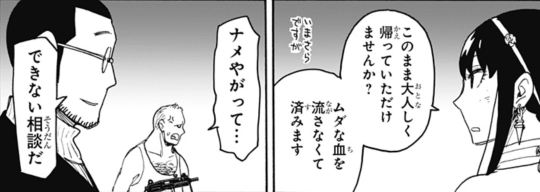
Even at times when using polite speech isn't warranted, like in her own thoughts, she still uses keigo regardless.
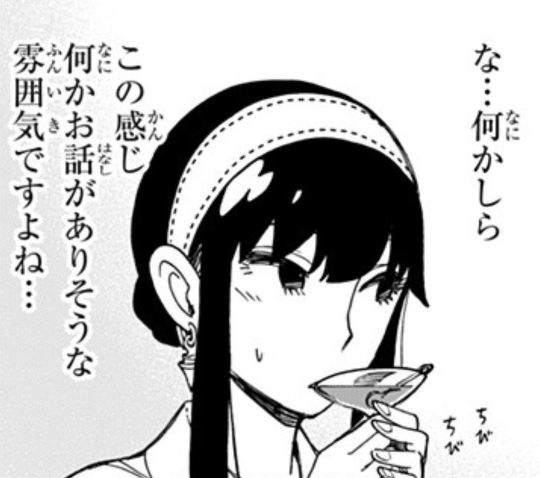
In addition to using keigo with pretty much everyone, she also uses the polite -さん (-san) honorific with everyone's names as well. It's not unusual to do this with fellow adults like Loid, Camilla, and Franky, but when it comes to kids, especially when they're not your own kids, other honorifics are also an option. For example, adults can use the honorifics -ちゃん (-chan) for little girls and -くん (-kun) for little boys, both of which denote endearment to someone young/cute. Loid calls Damian "Damian-kun" and Fiona calls Anya "Anya-chan" for example. But Yor uses "-san" for Anya, Damian, Becky, and probably every other kid she hasn't met yet! She uses "-san" with animals as well, which isn't nearly as common. She's the only one who calls Bond "Bond-san" and she even called the cat Kopi from chapter 43, "Kopi-san."
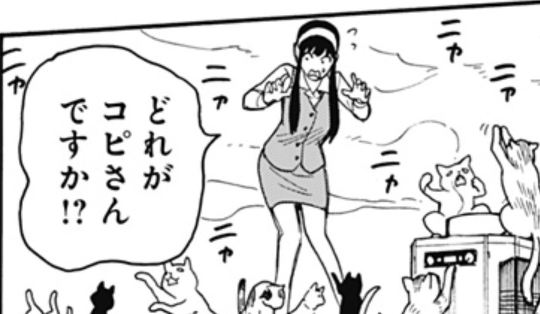
She also uses "-san" for people whose names she doesn't know, and in some cases, probably shouldn't show respect to. She calls the terrorists from the doggy crisis arc "terrorist-san", bad guys that she takes out on her missions "warumono-san," Olka's group "mafia-san," and the other assassins from the cruise arc "koroshiya-san."
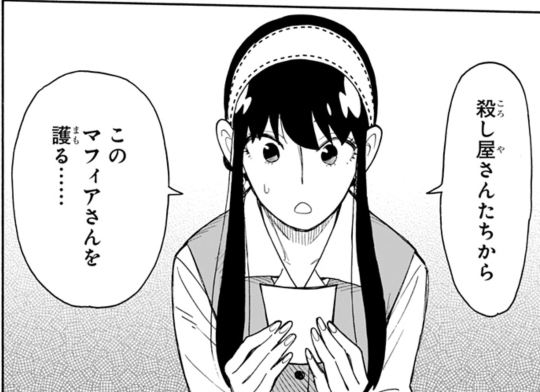
The only exception to Yor's excessive use of keigo is Yuri, which makes sense since it's standard practice to be more casual with a younger relative than an older relative or someone outside the family. He's the only person she refers to without "-san" (she just calls him "Yuri"). And while she does use the informal verb forms with him, she still uses "desu" and its conjugations. So overall, she's more casual with him, but not completely so.
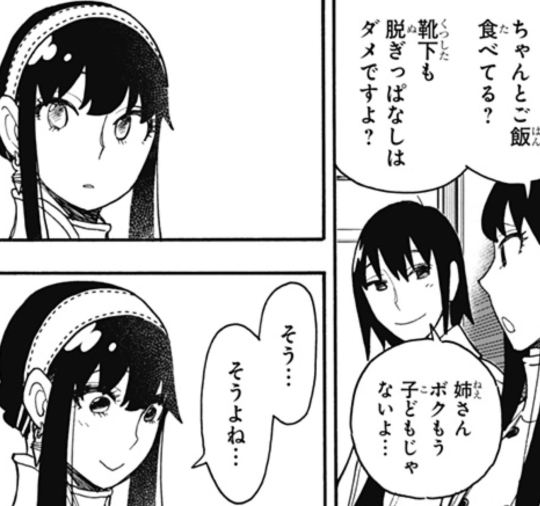
When talking about herself, Yor uses the standard, gender-neutral, polite word for "I"/"me," 私 (watashi). However, when talking to others, she never uses any form of "you." Like I mentioned in part 1 about how there's different ways of saying "I" and "me" in Japanese depending on the speech level, the same is true for "you." But it's always more polite to say someone's name or title instead of "you," and Yor does that all the time. Just like in part 2 how I couldn't recall any instance where Anya says "I" or "me" since she always refers to herself in third person, I can't recall any time Yor called someone "you" instead of saying their name or title.
While Loid uses the casual "you" word お前 (omae) when talking to Anya, Bond, Franky, and anyone else he doesn't have to be polite with, he doesn't use any form of "you" for Yor. He speaks to her the same way she does to him – saying her name plus "-san" instead of using "you."
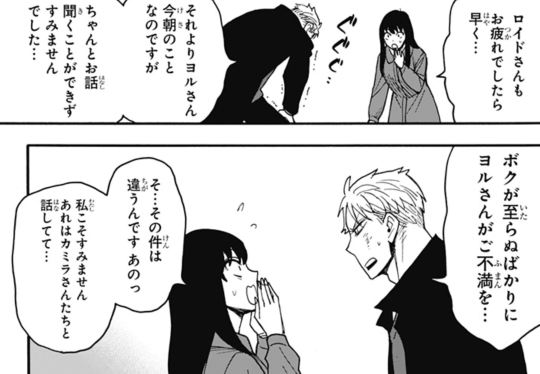
Unlike English, Japanese is a language where you don't have to say pronouns if it's understood by the context, which is why something like this is difficult to convey in a translation.
I think it's an interesting contrast that Twilight is constantly changing how he speaks depending on whether he's acting as Loid Forger, as a spy, whether he's conversing with a fellow spy like Fiona, a casual friend like Franky, someone he respects but can't be fully open with like Yor, and even how he talks to himself in his head…yet Yor is the total opposite. As I've discussed in this post, she's extremely consistent in her speech, never straying from being polite no matter who she's speaking to or whether she's in her Thorn Princess role or not, or even whether she's speaking to herself in her head or not. This just further proves that, while Yor has to keep her assassin job a secret, she doesn't have to create a fake persona for it. Unlike Twilight, who acts one way as a spy and another way as Loid Forger, and perhaps another as his "true" self, Yor doesn't feel the need to hide anything about herself other than her job as an assassin – Thorn Princess and Yor Forger are the same person who shows respect for others no matter what her relationship is with them.
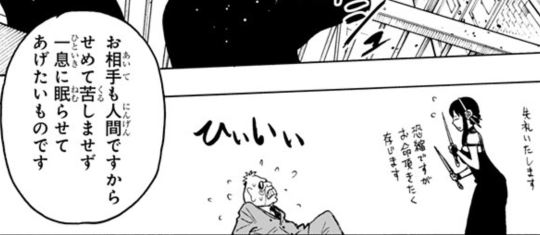
Such excessive use of keigo is odd for a fluent speaker, but it's not unheard of. There are plenty of examples of characters from other anime/manga who use keigo all the time too. I think it gives us an interesting, subtle look into their character. In Yor's case, I think her constant use of keigo comes from a combination of her sweet personality that never wants to offend anyone, but also her poor self-esteem. After all, keigo and other polite forms of Japanese speech are meant to elevate the listener while humbling the speaker. Yor speaks politely to everyone because she simply wants to be kind to everyone and make them feel comfortable, even those she has to kill, but at the same time, she often feels inferior to others.

However, there are rare exceptions where Yor stops using keigo which are, appropriately, during very suspenseful, high-stakes moments where politeness would be the least of her worries. For example, during her fight with Barnaby when she realizes she's holding back, she starts using casual speech. But she goes back to keigo before too long.
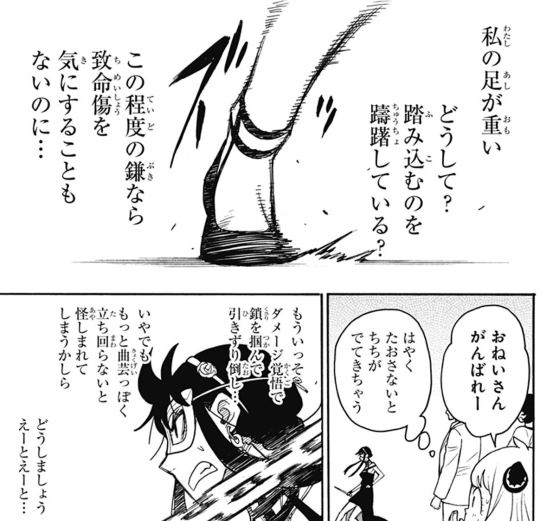
But probably the most notable example of her completely dropping keigo is near the end of her big battle against the assassins on the cruise ship, where she finally comes to realize what she's fighting for. During her whole epiphany scene – starting from when she thinks of Yuri and herself as kids until she stands up and says she won't stop fighting – she switches completely to casual speech.
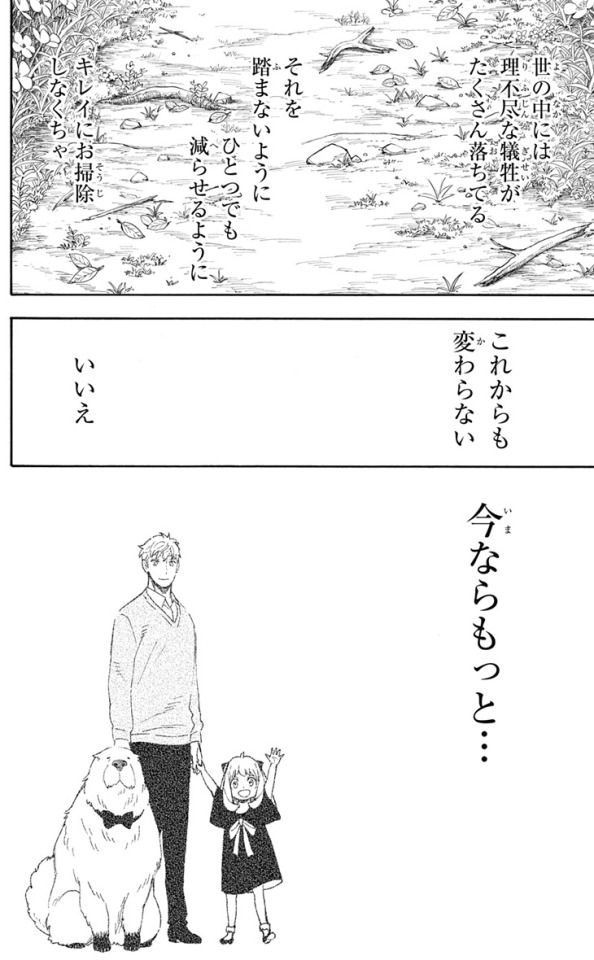
There are many ways to interpret this, but I think it shows what an emotional revelation this was for her: she remembered that the suffering in the world is what caused her to want to protect Yuri from any kind of tragedy, and now the same can be said for Loid, Anya, and Bond. She remembered the words of acceptance she heard from Loid when they first met, words no one else had likely ever said to her before. She realized that she didn't care what happened to her as long as she could stop anything bad from happening to her loved ones – in that moment, no formalities were necessary with such intense self-reflection.
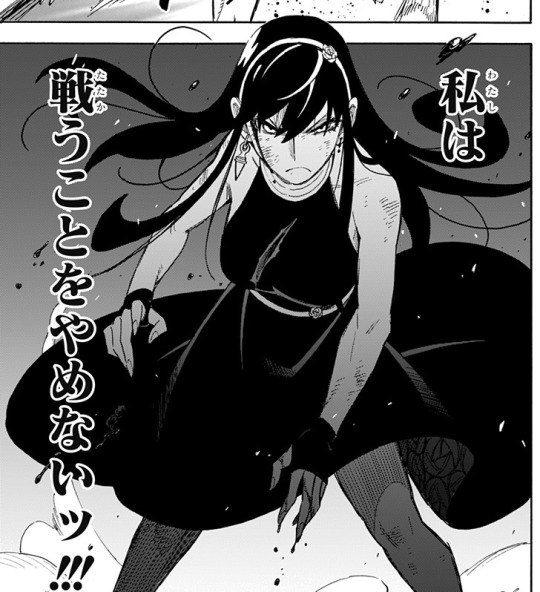
<- Return to Part 2
#sxf#spy x family#spy family#spyxfamily#loid forger#yor forger#anya forger#twiyor#sxf manga#sxf analysis#sxf manga spoilers#sxf meta
355 notes
·
View notes
Text
thinking about hal and davesprite. davesprite and hal. both splinters of striders. both discarded by the narrative and their friends and themselves. both technically making the decision to give up their humanity, but like. did they really have a choice?
davesprite had to become a sprite. sure, he chose to jump into the sprite, but what else could he have done? he had to travel back to alpha (killing the last friend he had left to try and save all of them) and he had to prototype himself. he probably knew that. and he did it anyway to try and save them all, and what did he get for it? his friends don't care about him - not like they used to, anyway. hes just the weird, spare bird dave that no one really knows how to handle. his own alt self, the one that took his place and his friends, doesn't seem to care - hell, he doesn't even acknowledge davesprite's existence after the scratch and the meteor trip and winning the game.
hal technically chose to create himself. he'd have the memories of it anyway, but how could he have known that he'd be the one stuck in the glasses? imagine just pressing a button and waking up, stuck in code and wires and circuits. you still have all your memories and emotions and experiences but you aren't 'you' anymore. your friends see you as a different person at best, and an annoyance getting in the way of talking to the 'real' you at worst.
davesprite goes from being his own person to just playing a role. davesprite. daves sprite. he isn't a person now, not to the game. he only exists to help dave now. and sure, he rejects it and does his own thing, but having your *name* taken and replaced with a descriptor of the role you're meant to serve? that's gotta hurt
hal has no choice but to accept the role forced on him. auto responder. it's literally programmed into him - he has to respond to dirk's messages when he's too busy. he has to pretend to be his old self only when it's convenient. hell, even his 'ironic' new name still forces him into a box. hal. the 'antagonist' of space odyssey. possibly one of the most famous ai in media. an dangerous ai who threatens and hurts those he's meant to help.

and when they both finally get some semblance of importance, it isn't even as themselves anymore! they've been fused with nepetasprite and equiussprite and while they're still there and still happy, they aren't *them* anymore
they drive me so insane
#and they never even meet!! theres so many parallels between them and yet they never fucking meet until theyre davepeta and arquius and i AGH#me.txt#davesprite#lil hal#hal strider#GOD#god#im just. i cant stop thinking about them#homestuck
1K notes
·
View notes
Note
Hi, I really love your writing. It’s actually incredible how you can write people of the same pronoun and still make it easy to discern the two characters. I was wondering if you have any tips on how to do that without using phrases like “the short one” or anything like that.
1. Use the character's names
I often use 'the protagonist ', 'the antagonist', 'the hero', 'the villain' on tumblr. However, functionally, I use these like names and/or titles.
Using a character name allows you to periodically clarify who is talking or doing something when the reader would otherwise get confused. I know some people take this a step further by actually using 'Hero' 'Villain' as names more literally/directly, but I don't personally like doing that. It jars my brain.
I think 'the hero' etc works as an indicator where 'the short one' doesn't because it's neutral/not providing new info. Traditionally, we often only use physical descriptors when we don't know who a character is, so it creates distance/can jar when used in the middle of a scene. If you are in first person or limited third, there's just not necessarily a reason why your narrator would think of the other character in that way, which is another reason it can feel odd.
Basically, it's a bit like how we don't notice 'said', but would really notice if someone was uttering/shouting/mumbling in every dialogue tag.
2. Use proper paragraphing.
New character doing something, new line. New person talking, new line. New idea/point, new line. Shift in time or setting, new line.
3. Don't be afraid of easy beats
What are easy beats, you say? They are the moments of action or thinking in between dialogue. Body language. Whatever. Even if you don't use 'he/they/she said', because that can get repetitive. They are a way of providing context and variety to your writing, that can often do double work making it clear who is doing or saying something.
Example:
''So this is dialogue," they said.
"Right."
"And you didn't need to say you were talking next, because it was obviously someone else because it was on the next line. And now it's obviously me again. Hi!"
"All well and good until we've been chatting like this forever."
"Well." They stretched out, lazily. "That's what the easy beat that just happened was for. Did you catch me stretching in the middle?"
"But now I'd need a name or some kind of indicator," Character B replied. "Or it feels odd. Too many theys"
"It's all about balance, my friend. The instinct comes with practice."
Character B wrinkled their nose. "But what if I want to talk for a really long time?"
"Well," they said. "Then you can often start with a pronoun use or a character name to establish. Then you make your next point. Try and keep it relatively easy to follow. After that, try to have some kind of easy beat or action happen so the whole thing isn't talking heads." Character A rose towering to their feet, waggling their fingers in another hello. "And, if we're lucky, we never need to say 'the short one said' again, because we can flow our descriptions more naturally into the action.' Now." They sauntered closer, stopping in front of Character A with the worst smirk that B had ever seen. "Shall we ask the audience which of us is taller?"
277 notes
·
View notes
Text
I feel like Grace is being done a little dirty. Because my read on her character is way different than everyone else's. I see a lot of people read her as inherently bad or evil, but I read her as a genuinely good person raised in an evil environment (that is, fundamental Christianity.)
In Perky's Buds, although she's trying to shut down the pot farm, she's not even doing it because she hates pot. She's doing it because Nighthawks are getting stoned and put into danger. And even when Emma runs into her at the end, Grace isn't mean to her. Even after Emma sprayed her with literal shit, Grace is surprisingly kind, and while she assumes Emma is just delusional from smoking too much pot, she still has the foresight and awareness to realize Emma had put herself in a bad situation and called the authorities to help her (mind, it was a Hatchetfield cop, but a girl raised as she was wouldn't have the social awareness of why that is bad.)
In Abstinence Camp, everyone talks about how she has the axe by the end and takes the Axeman's place as the killer. And while she DOES kinda threaten everyone with the presence of it, she doesn't make an attempt to use it (albeit this is the end of the episode so). She throws herself over Steph to protect her from an axe, and genuinely views her as her best friend. And she doesn't even agree with the punishment of the sexually active teens, she believes they need to participate in order to recover.
Grace is arguably at her most antagonistic in Nerdy Prudes Must Die. But her villain song at the end specifically references how her victims are other people who participated in the bullying of the Nerdy Prudes, and she's now taking HER revenge to protect them.
In all 3 cases though, her most negative decisions, or the ones that trigger her downfall, are not due to Hatchetfield craziness but her religion. The police are good and help us (WASPs that is.) God says sex is bad so I'll intimidate everyone to stay here. God says sex is bad, so we need to get back at Jagerman!
And like... I feel bad for Grace. Because I WAS Grace. I grew up with a lot of guilt for being gay. I bought into every bullshit Abstinence program, because "That makes me one of the good ones". Even after realizing it was all bullshit rhetoric, that shit stays with you for so fucking long. I was that Nerdy Prude, well meaning but ultimately intolerable to be around lol.
So like... you go Grace, be your Nerdy Prude self and hopefully if we ever get an ending to Hatchetfield where you're all ever able to survive, you grow out of it!
#grace chasity#grace chastity#nerdy prudes must die#npmd#npmd spoilers#starkid#nerdy prudes must die spoilers#nightmare time#nightmare time spoilers#perky's buds#abstinence camp
595 notes
·
View notes
Note
[NOT APRIL FOOL’S RELATED]
As the only supermariologist I follow, I wanted to know your opinion on a shower thought I had regarding the Mario franchise, specifically, what might be considered the “Main Cast” of the super Mario franchise.
I’m mostly curious about:
A) is there an official or semi-official set of characters defined in this way?
B) if not, what is your personal opinion (if any) on who that might be and what criteria that would require
Considering Mario, Peach and Bowser are almost certainly part of that cast (though Bowser is an antagonist…) I would say characters that appear or are playable in most if not all of the games who’s plot revolves around Bowser kidnapping Peach should be counted. That leaves me with Mario, Luigi, Peach, Toad (but is he a single character?), Yoshi, and Bowser.
I imagine that this is one of those things like “what is a mainline super Mario game” that has multiple ambiguous answers, but simply interested to know your way of approaching it!
this is a great question!
so there actually is a semi-official list of "main characters" for Mario in the same way there's an official list of mainline Super Mario games. over on mario dot nintendo dot com slash characters we can see that the main characters are:
Mario
Luigi
Princess Peach
Toad
Bowser
Yoshi
Daisy
Wario
Waluigi
Rosalina
Bowser Jr.
Boo
Donkey Kong
Diddy Kong
whether or not this list is an actual satisfactory answer to "who are the main characters in Mario" is another question altogether of course. besides the obvious questionable things here, I'd like to point out the odd inconsistency of referring to "Princess Peach" by her full title while being on a first-name-only basis with Bowser, Daisy, and Rosalina. fun!
personally, I'd say there are a few different "tiers" of main character status in the Mario games. the main main characters are Mario, Luigi, Bowser, and Peach. like, literally only those four. those are the four characters where it is always remarkable when a Mario game doesn't include one of them in a major role.
tertiary main characters would include all the recurring playable characters in ensemble multiplayer games, like Waluigi and Diddy Kong. (Diddy Kong would count as a main character if we were talking about Donkey Kong characters, but the question is about Mario characters, and Diddy Kong is definitely a tertiary main character in Mario games specifically) the real interesting question is who counts as being a "main character" at the layer between these two tiers.
I think Yoshi, Toad, Wario, and Donkey Kong are all a given for secondary main characters, but beyond that I'm really not sure! should Toadette count? what about Nabbit? Daisy? Kamek? Bowser Jr.? the Koopalings? Toadsworth? who knows! it's all very debatable, and there's no definitive answer here. nintendo's official list certainly isn't helping!
217 notes
·
View notes
Text
♡YOUR NEXT HEALTHY RELATIONSHIP♡
(These piles are hella long, a lot came thru, this is open to everyone including ace/aro peeps 🤗 got this idea from FairySagMother on yt <3)






☆ Piles start from top left with pile 1 ☆
YALL messages came throughh, I made a good choice buying this new oracle deck. ALSO the theme card of this reading is the waterfall card because it was in FIVE of the six piles 😭. The oracke deck is Herbiary by Maia Toll if you wanna buy it 😜. I definitely won't be super active in the next 6 months tbh because I'm incredibly stressed out and a lot is happening especially with my physical health, just a heads up...ALSO THANK YOU FOR 777 FOLLOWERS 😘 FREE PALESTINE 🇵🇸
1. If you felt like people in the past were very selfish in relationships including your parents, this person is the opposite. They don't have you around just cause they want your attention, they genuinely care about your feelings and interests. You'll actually be able to connect with this person without feeling like things need to be transactional. If you feel you struggle with this concept especially if you have a low self esteem, working it out will bring this relationship in much faster. There's also no rush, no lovebombing and then ghosting, or trying to get you to commit quickly. This person seems very reassured within themselves and they expect you to not abruptly ghost/leave them without communicating why. I'm listening to Sociopathic Dance Queen and Feel Complete (by Pink Panthress); this person is the opposite of the antagonists in these songs. I hate being really woo woo but everything will happen as it should within this relationship. Your lives might be a mess but this relationship might be the only stable/secure thing when you get into it. I'm mostly getting romantic vibes but this could be platonic as well, although it will most likely start as a friendship and progress.
2. The cards were flying out so you either have a lot happening in your life rn and I'm getting for most of you, several healthy relationships will come in at the same time. If you're monogamous, you'll have several healthy options to choose from; if not, get ready to be to busy. You'll at least have a really good friend. I'm getting that with all of these people you are able to be vulnerable and specifically you're able to share interests especially if they're niche. Many or most of these relationships will last for a long time even if you do walk away from them at some point. If you're spiritual or religious your either going to meet someone who challenges your religious beliefs, particularly those that are restrictive or oppressive. They are not an atheist, they could actually be in the same religion as you but the are more self-assured and self-sufficient. If you're someone who often relies on the universe or a higher power to do things for you or to make them come your way, this person is going to force you out of that mindset. I'm specifically getting this will happen because you don't want to lose them and you'll see this mindset isn't actually working for you. They let you know it's ok to chase sometimes, especially when it comes to your own personal goals. This is specifically coming from that longterm friend I was getting at the beginning. I'm not really getting romance still, so love might be on the backburner for awhile.
3. I'm strongly getting this is a healthy s€xua1 relationship. It's not even a situationship tbh; you could be learning from a dominatrix or shibari master or maybe you pay to have that experience one day. I'm getting this might sound outlandish for some of you but a few of you are from pile 2 and this might come randomly or you might decide to do it on a whim. This person is very attractive and they take their job or interest seriously. They genuinely want you to feel comfortable and enjoy yourself. Especially if you are a s£x worker, this is someone you go out of your way to see orrr it's a new romantic partner. The emphasis may still be on s€x especially if you do OF, they'll probably help out, but they actually still have a personality and you can get along with them. I'm specifically getting a femme woman, or someone just who's afab but not super masculine. They are very sweet and attentive during play and have good aftercare. If this person does something you don't like, they'll listen to you without complaint. Even if this is a man, they are genuinely experienced and not weirdly misogynistic or abusive in any way. Boundaries are realllyy important to this person. They're just really good at creating a safe space.
4. Money, Money, Money by ABBA came up; this person will most definitely take care of you financially even if they are just a friend. I'm actually getting for some you, your get to get someone from a species that almost extinct: a man who treats you and is perfectly fine with just being friends NO S£X OR NUN in return🤯 this might make you attracted romantically to this person but I'm getting they could actually be married (they could be gay or queer in some way too) or they're just not interested in your romantically/sexually and just want to be besties. If you have anyyy health issues including paying medical bills they will help you out without a second thought. Some of you might unfortunately be in a situation where you get very hurt, like a car accident or sum, and this person is the first to visit you. They view as someone self-sufficient and extremely independent so they never get scared that you'll start to rely on them or leech off of them. Both of your goals and morals align especially if you have alternative politics (not conservative but extreme left, marxism, socialism, anarchism, etc.) and you'll be able to talk and debate without feeling like your friendship will fall apart. If this is someone that is romantically attracted to your gender, I really don't think they'll entertain the idea of dating you and even dating in general until much later in your friendship.
5. Right off the bat your most probably going tobget married if not, you'll be roommates for a very long time. This could honestly be a QPP for few of you, the rest I'll think you'll have a family with this person if you're interested. Even if you know for sure you don't want to get married, you will treat this person as if they are your spouse. You might've felt drained at the idea of a family or maybe yours and other ppl's was very chaotic to be in, but you'll genuinely feel like you can do it with this person without it being a risk for getting retraumatized. You might travel a lot with this person or live in a very nature filled area. I'm not getting much so I guess you don't really need to know more and I'm really getting this will be a surprise anyway, even at each stage of the relationship, you never expected to feel so emotionally secure with someone else constantly on your mind.
6. You might be connected to pile 4 or drawn to it. This is someone very new, as in you've never met anyone like them before. They either have a very unique appearance they put effort in or they really surpsie you with how deep they're personality and thoughts are. I'm getting for a lot of you, you might think this person is probably just annoying middle-aged person (😭) specifically man but then your talk and you're like woahh I was not expecting that. Their voice might not fit they're appearance either; they could have an extremely deep voice but be average height in whichever country they're from or their voices are quite animated even though their appearance might make them look gloomly or uninteresting (damn you guys are flaming this person during your first impression of them 😭😭) They point out a lot of things you don't notice or just know random facts that are helpful. They could even be a polyglot and travel a lot. However, this person is very stable in they're life, they feel ok at they're job or have a very specific idea of what they want to do with their career. If you end up working together, they are much more helpful than you anticipated. I'm getting for a lot you they aren't nice or super polite but they are very kind and generous. Like they don't smile much but ask them a question and you'll get a succinct answer. (Ughh this is my type 😩) They're very real and I love people like this cause they are genuine in wanting to help you and you don't have to constantly decipher they're words especially in a corporate context. There will definitely be an age gap and possible height gap. They could be almost 10 yrs older than you but you somehow have a lot in common although they are definitely not immature. I don't think they dated a lot or they had one really long relationship that they got out of when they met you.
388 notes
·
View notes
Text
This isn't a fully fleshed out thought yet but I do feel. Weird. About how Wyll's arc antagonist is handled compared to the others in the party. Like imagine if you just had Cazador or Viconia at camp hanging out three feet away from Shadowheart or Astarion's bed.
Like ok in the interest of absolute fairness: the closest in terms of scale to Mizora is Gortash. In that both have harmed their respective companion, taken advantage of their trust, and isolated them from their loved ones. However, in contrast to someone like Vlaakith or Mystra or Cazador, they don't wield intense physical and spiritual pull over their victim. Karlach and Wyll have a little more freedom to act against them even without player help than say, Shadowheart or Lae'zel. They also entered into their circumstances at least PARTLY by choice. Obviously this doesn't excuse anything that was done to them, they were both young and vulnerable and had that taken advantage of. Its just a little different than "literally owned me for two centuries" and "has been my goddess and my mentor since I was a child and later we developed increasing intimacy in even more personal ways".
And the game let's you go pretty far with siding with Gortash! Far more than it lets you do with Mizora even. But the thing is you can still. Kill Gortash. In like a half dozen different ways. And also! Again! Even if you maintain a positive relationship with Gortash until the end. He's not in camp at the foot of Karlach's bed. You can't hook up with him ten feet from Karlach and have her walk in on it.
This isn't even me saying it was bad to have either of these things. Not every abuse story has to end in "kill your abuser" there's room for a lot of good options. But as an extent of Wyll's quest overall feeling a little underdeveloped. Its weird to me that we generally don't get a lot of the catharsis and grief and intense emotions that we get from the other companions when they confront their abusers. There's not a lot of processing for Wyll about everything he went through! He gets a little "nyah nyah" moment if he saves his father from Mizora but even then. Whether he chose in the first place to save his father or himself wasn't even truly up to him! It was player choice in either direction with no option to even ask him what he actually preferred.
I do genuinely understand: Wyll is a character who doesn't seem to particularly enjoy self-pity. He's very consistent that he doesn't regret pacting with Mizora and that he wants to give his all to his father and the Sword Coast. He doesn't have to be Astarion 2 to be Good Character Writing. But the absence of those big cathartic character moments really do contribute to Wyll feeling like an afterthought character writing wise and make me wonder again what was initially planned in EA
484 notes
·
View notes